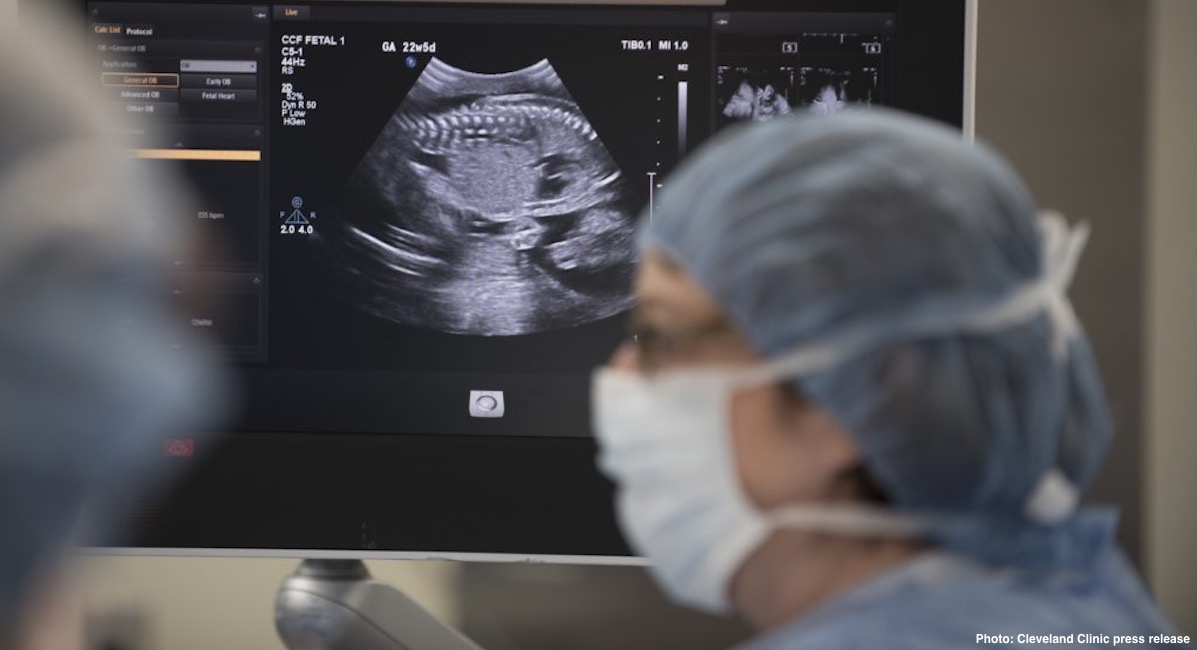A prenatal surgery pioneered 10 years ago to treat spina bifida has just been performed for the 100th time at Cincinnati Children’s Hospital.
Kelsey Song was 33 weeks pregnant when she gave birth to her daughter, Flora, who had earlier been diagnosed with spina bifida. “We were devastated when we first learned that our daughter was not ‘perfect’ and diagnosed with spina bifida,” she said in a press release. “But the specialists we consulted with at Cincinnati Children’s were so compassionate, supportive, and enthusiastic – and gave us so much hope.”
At 20 weeks, Flora had been diagnosed with myelomeningocele, the most serious form of spina bifida. With myelomeningocele, the backbone and spinal canal push out through an opening in the spine, leaving the baby at risk of life-threatening infections. The spinal cord is also exposed to amniotic fluid, which can impede fetal development, such as what is called a Chiari malformation, where the brain is pushed down through the base of the skull.
“Children who are born with myelomeningocele can experience serious health problems such as hydrocephalus, which is a potentially fatal excessive accumulation of fluid in the brain, and leg weakness or even complete paralysis. The severity of leg weakness depends on where the opening occurs in the spine,” Charles Stevenson, a pediatric neurosurgeon and co-creator of the Fetal Myelomeningocele Surgery Program at Cincinnati Children’s, said in the press release. “To help these babies have better functional outcomes, we began more than a decade ago performing and refining prenatal surgical techniques to optimize safety and efficacy for both mother and baby.”
A 2011 study called the “Management of Myelomeningocele Study (MOMS)” found that prenatal surgery can greatly lessen the complications from myelomeningocele, including hydrocephalus. It also can have a greater effect on future abilities, such as leg strength and the ability to walk. Surgeons at Cincinnati Children’s completed the first open repair surgery for a baby with spina bifida in 2011, and Flora Song was their 100th surgery, 10 years later.
“Our team works closely with each family to determine whether fetal surgery is a possible solution,” Foong-Yen Lim, surgical director of the Fetal Care Center, explained. “Fetal surgery for myelomeningocele can offer significant benefits to the baby, but it also carries serious risks and potential complications.” Stevenson and Lim performed the first myelomeningocele surgery in 2011 at Cincinnati Children’s, and operated together again on Flora, along with doctors Jose L. Peiro and Kara Markham.
During the surgery, surgeons remove the myelomeningocele sac and repair the spinal defect before closing the preborn baby’s skin. The mother’s uterus and abdomen are then closed, and the mother continues with the pregnancy. A less invasive procedure, called fetoscopic repair, has also recently become available. Using an ultrasound to determine the location of the baby, doctors choose the best location to insert a port and then expand the amniotic cavity using humidified and heated carbon dioxide to create more space. Through a second port, doctors insert a camera to see and then use two additional ports to insert instruments and make the actual repairs.
“We are starting to do more fetoscopic repair surgeries because it allows the mother an opportunity to have a vaginal delivery versus open surgery which requires a Caesarean,” Peiro said in the press release. “Fetal repair offers a number of benefits for the baby. It can lower the rate of hydrocephalus and decrease the need for brain shunts. Plus, it can reduce the risk of damage to the spinal cord and nerves caused by exposure to amniotic fluid. Our goal is to repair the damage as soon as we can.”
READ: ‘She’s wiggling her toes’: New, less invasive spina bifida surgery a big success for Abigail
According to Kelsey Song, Flora’s surgery was a huge success. “Flora had a head MRI while in the NICU, which showed significant improvement in her Chiari Malformation,” she said. “However, in Flora’s case, fetal surgery allowed her brain time to reverse back to a more normal position before birth. Her MRI showed a very healthy brain with no pressure buildup, which is amazing and, for us, means that her surgery was successful!”
Preborn children diagnosed with spina bifida are very frequently targeted for abortion, despite these groundbreaking new treatments available. According to Dr. David Stitelman, surgical director of the Yale Fetal Care Center, roughly half of these preborn children will tragically be aborted.
As for Flora, who spent a month in the NICU before going home, she’ll have check-ups every three months at the Spina Bifida Clinic at Cincinnati Children’s, where her growth and development will be closely monitored. “We are so very thankful for Cincinnati Children’s and for everyone we worked with over the past several months,” Song said. “Our fetal surgeons, fetal nurse coordinator, maternal-fetal-medicine doctors, neonatologists, NICU therapists and NICU nurses are incredible. They truly have changed our lives and our daughter’s life.”
“Like” Live Action News on Facebook for more pro-life news and commentary!







